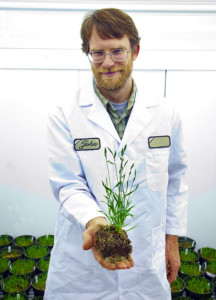
John Vogel, DOE Joint Genome Institute
Dr. Vogel joined JGI in 2014 to establish a plant functional genomics program. Prior to this, he served as a Research Molecular Biologist at the USDA for 12 years where he was a driving force behind the development of numerous genomic resources that fostered the widespread adoption of Brachypodium distachyon as an experimental model for the grasses. In addition to this fundamental work, he established an efficient switchgrass transformation pipeline and, in collaboration with industrial partners, generated hundreds of transgenic switchgrass lines in an effort to create improved varieties for biomass production. He did his postdoctoral studies at the Carnegie Institution for Science where he studied the molecular basis of a plant host’s susceptibility to pathogens. Dr. Vogel’s current research is focused on developing plant functional genomic resources (e.g. sequenced mutant collections, transformation technology, epigenetic analysis techniques) and utilizing these resources to understand genome organization and regulation, abiotic stress tolerance, and the mechanisms by which plants interact with their microbiomes. In addition, his group conducts comparative genomic research to understand the evolutionary and practical significance of plant pan-genomes including understanding polyploid genome evolution in a pan-genomic context. Dr. Vogel also serves as an adjunct professor at UC Berkeley in the department of Plant and Microbial Biology.
Education
- BS in Plant Science, Cornell University, NY
- PhD in Biology, University of Illinois at Chicago, IL
Awards and Service
- 2018-present Member ,EcoFAB steering committee
- 2014-present Chair, International Brachypodium Steering Committee
- 2013 USDA Award for Outstanding Performance
- 2005-2012 USDA Awards for Superior Performance
- 2008 CSIRO McMaster Visiting Fellowship Australia
Research Interests
Dr. Vogel’s research is focused on developing plant functional genomic resources and utilizing these resources to understand genome organization and regulation, abiotic stress tolerance and the molecular basis of perenniality. Most projects in his lab utilize B. distachyon and related species as model systems to develop knowledge that will ultimately be used to improve biomass crops like switchgrass. Major projects currently underway include: 1) Using a trio of Brachypodium species as a model for polyploidy in order to understand polyploidy genome evolution and regulation 2) Determining the molecular mechanism of engineered resistance to multiple abiotic stresses and the molecular basis of perenniality using the perennial model grass Brachypodium sylvaticum 3) Developing a comprehensive collection of grass mutants by sequencing chemical and radiation induced mutants.
Select Publications
- Gordon, et. al. 2020 Gradual polyploid genome evolution revealed by a pan-genomic analysis of Brachypodium hybridum and its diploid progenitors. Nature Communications 11 (1), 1-16 https://doi.org/10.1038/s41467-020-17302-5
- Varoquaux, et. al.N. 2019 Transcriptomic analysis of field-droughted sorghum from seedling to maturity reveals biotic and metabolic responses. Natl. Acad. Sci. 116 (52) 27124-27132
- Sasse, et. al.J. 2019 Multilab EcoFAB study shows highly reproducible physiology and depletion of soil metabolites by a model grass New Phytologist 222: 1149-1160 https://doi.org/10.1111/nph.15662
- Gordon, et. al. 2017 Extensive gene content variation in the Brachypodium distachyon pan-genome correlates with population structure. Comm. 8(1), 2184 doi: 10.1038/s41467-017-02292-8
- Genetics and Genomics of Brachypodium. 2016 Vogel, J.P., Springer, Switzerland. ISBN: 978-3-319-26942-9
- Gordon, et. al. 2014 Genome Diversity in Brachypodium distachyon: Deep Sequencing of Highly Diverse Inbred Lines 2014 Plant Journal 79: 361–374 DOI: 10.1111/tpj.12569
- Hsia, et. al. 2017 Sequencing and functional validation of the JGI Brachypodium distachyon T-DNA collection. Plant Journal 91(3): p. 361-370.
- Vogel, et. al., 2010 Genome Sequencing and Analysis of The Model Grass Brachypodium distachyon. Nature. 463: 763-768